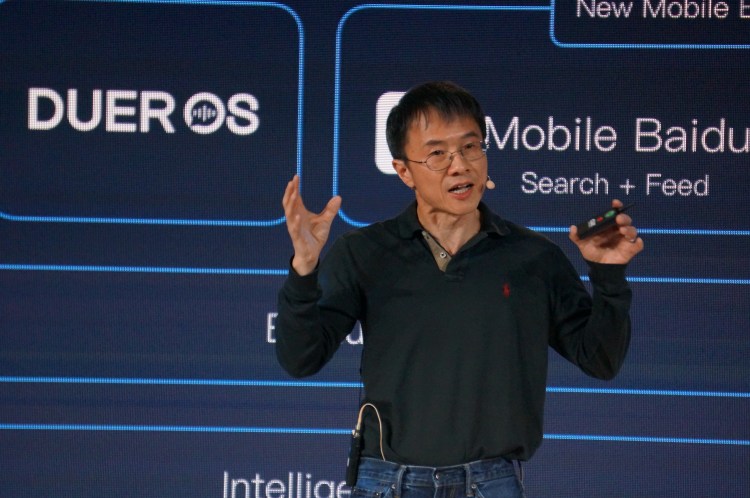Watch all the Transform 2020 sessions on-demand here.
When Baidu COO Qi Lu took the stage at his company’s first CES press conference yesterday, he had a clear message for the audience in Las Vegas: China is coming to dominate the AI market around the world. In his view, the country’s population, regulatory environment, and wealth of data means that China is poised to lead the world in AI innovation.
“What will give an edge to China is a much larger population and a fast growing market,” he said. “And a favorable policy environment designed to nurture and enable more data harnessing and AI technology.”
In his view, the current era of innovation stands in opposition to past decades when the business climate in the United States made it the home for leading technology companies. But China is catching up thanks to its AI-friendly approach.
To begin with, China has a lot more data for AI innovation. Collecting data from the country’s 1.38 billion residents — 1.1 billion of whom use smartphones, and 750 million of whom are online — is easier in China than it is in other markets, Lu said. Acquiring that data could then lead to better AI systems, allowing companies working in China to have an advantage over their competitors in other markets. Data from the company’s manufacturing sector could help with the creation of business-specific AI.
June 5th: The AI Audit in NYC
Join us next week in NYC to engage with top executive leaders, delving into strategies for auditing AI models to ensure fairness, optimal performance, and ethical compliance across diverse organizations. Secure your attendance for this exclusive invite-only event.
“The Chinese government understands what AI can do, and they show a lot of commitment for sustained and long-term investment,” Lu said. “AI is part of China’s national five-year plan, and just a few months ago, the Chinese government published a comprehensive white paper to call out a systematic investment in AI.”
The government has thrown its support behind the creation of AI as part of national planning exercises, and it has started using machine learning to power key national infrastructure like surveillance cameras. A couple months ago, the Chinese government called Baidu’s Apollo self-driving car platform its national platform for creating autonomous vehicles.
Not only that, but cities inside China, including Beijing and Baoding, have created new rules making it easier to test autonomous vehicles on city streets. Xiongan, a planned mega-city near Beijing, is working with Baidu to build infrastructure that supports the long-term operation of autonomous vehicles.
Lu also said that China’s success in the AI field will help people around the world. In his view, advancements made in China will reach beyond that country’s borders, and a rising tide of innovation would help everyone around the globe. His comments tie into the current state of the AI ecosystem, with researchers around the globe sharing their work with others to drive innovation.
Case in point: Baidu has open-sourced its Apollo software and announced a major update yesterday that will make it easier for developers around the world to build autonomous vehicles.
However, China’s approach to artificial intelligence does raise questions about how its innovations will translate to the rest of the world, given the country’s human rights record. Technology companies in China see AI as a key tool for helping the country’s government increase its surveillance capabilities, in addition to its more generally altruistic features.


